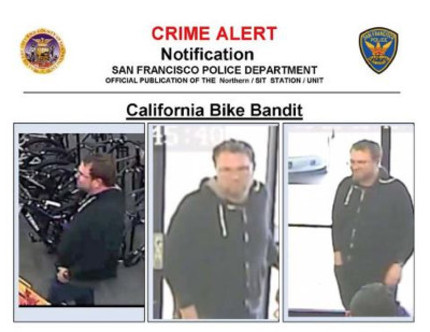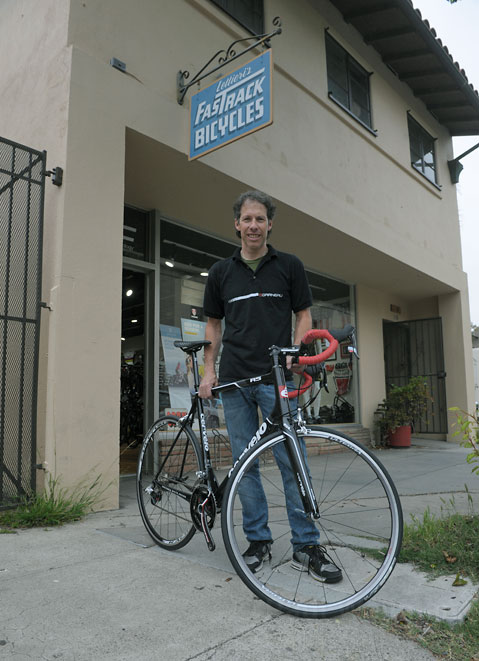‘California Bike Bandit’ Strikes in Santa Barbara
Stolen Road Bike Worth $6,700 Returned to Fastrack

Dave Lettieri knows a lot more about derailleurs than crime fighting, but he has unwittingly found himself at the center of a multi-agency search for a notorious bike thief. On February 29, the owner of Fastrack Bicycles, the go-to shop for much of Santa Barbara’s road cycling community, arranged a test ride on a $6,700 racing rig for a man who rode the floor model right down to the train station and hopped on a car heading north.
On March 3, a Sausalito man bought the hot bike — a Cervelo R5 — on Craigslist for $2,300. Realizing after the sale that the deal he got was probably too good to be true, the buyer conducted an online search for stolen Cervelos and hit upon a Facebook post Lettieri made at the time of the theft. The man returned the bike to Fastrack for which he was rewarded by Lettieri with a sweet deal on a bike for his wife.
Two weeks ago, a man named Jason Fashimpaur was arrested twice in Marin County, once by the Twin Cities Police Department and then, after posting bail, by the Sausalito Police Department for the Fastrack theft. When searching Fashimpaur’s home, police found train ticket stubs from Santa Barbara dated February 29 as well as apparent methamphetamine. Now notorious, he is suspected of stealing several bikes — at least seven — throughout the Bay Area and was dubbed the “California Bike Bandit” on a bulletin distributed by the San Francisco police.

It was Inspector Brian Danker of the SFPD, specifically, who invented the moniker. According to him, Fashimpaur is suspected of thefts in Santa Clara, Oakland, Berkeley, Sausalito, Palo Alto, San Francisco, and the Presidio (which falls into the jurisdiction of the U.S. Park Police). The alleged rash of meth-fueled bike thefts began at High Trails bike shop in the Nob Hill neighborhood of San Francisco. The first reported theft took place just down the street at a store called Lombardi’s Sports.
The model of the bike stolen from Lombardi’s was an Izalco Pro sold by the German brand, Focus. According to Lombardi’s manager, Mike Gil, it retails for $3,700. Shortly after Lettieri recovered his stolen Cervelo, a buddy of his noticed a Focus Izalco Pro in a woman’s home in Santa Barbara. He immediately became suspicious because no Santa Barbara shops sell that brand. The woman told him that a friend had asked if he could store the bike at her place. When Lettieri’s friend shared his suspicions, she immediately turned the bike over to Lettieri who began calling Focus dealers in the Bay Area. He dialed Lombardi’s on his second call and shipped them the bike after confirming it was theirs.
So not only was Lettieri a victim of the California Bike Bandit, he has become a key figure in the investigation. Fashimpaur’s alleged thefts were completed via a similar method. He would visit bike shops — sometimes calling ahead — looking for specific models which he would then test ride. Most shops require customers to leave an ID and credit card before they can take a bike outside the store. Fashimpaur allegedly used fake temporary driver’s licenses (which do not include a photo) and fake, embossed American Express credit cards. Lettieri said he realized after the fact that the man who stole his bike had left a gift card, not a credit card.
When someone attempted the same method two weeks ago at Sunshine Bicycle Center in Fairfax, California, employee Emile Mulholland recognized him — despite dark sunglasses — from emails and video surveillance footage that other shops in the Bay Area had disseminated. To be careful, Mulholland accompanied the customer on a test ride of a Trek HiFi Pro mountain bike. The customer complained about mechanical issues on the bike, which he asked to be fixed before coming back for two more test rides. On the third ride, Mulholland suggested that his manager check other bike shops to see if his customer might be the Bike Bandit. The Missing Link Bicycle Cooperative confirmed that they’d been victimized by a man using the alias “Kurtis.” Fashimpaur allegedly used two aliases: Jason Reznick and Kurtis Cerri. (He went by Jason at Fastrack.)
Mulholland’s boss called the Twin Cities Police who linked Fashimpaur to another Marin bicycle store theft before arresting him. According to Mulholland, Gil, and Lettieri, the bandit was so successful because he built a rapport with shop employees, getting them to let their guard down. He was knowledgeable about bikes and would come in looking for a specific model. Because serious cyclists form somewhat of an exclusive community, shop owners tend not to be suspicious of customers. Moreover, while shoplifters often swipe gear from bike shops, thieves rarely steal entire bikes. Lettieri said he’s had two bikes stolen in 15 years. (Bike thefts from the street are a different matter. Since May 1, 2011, 286 bike thefts have been reported in Santa Barbara.)
Danker surmises that with millionaires looking like Mark Zuckerberg, it’s hard to judge a potential high-end bicycle customer by the cover. The real story, however, says the veteran San Francisco cop, is that bicycles should come with some sort of technology that encodes identifying information like that on a driver’s license. Judging by the price he paid for his own carbon fiber Trek, he thinks bicycle companies can more than afford to implement such a technology. “If you can put a microchip in a puppy, you can put one in a bike.”



